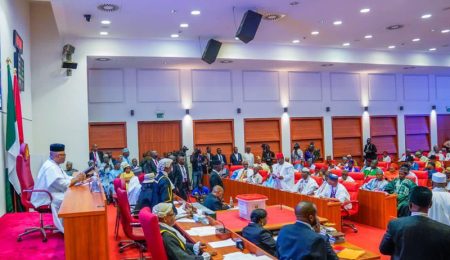Energy expert Nick Agule has argued that keeping electricity transmission under the government’s control is flawed, saying that distribution can’t function while transmission recycles the same equipment for 50 years.
He also faulted the government’s argument that transferring transmission to private hands will pose security risks, saying Nigeria’s privately-owned telecommunications pose a bigger security risk to the country and regulations exist to manage security exposures.
Speaking during an interview with ARISE NEWS on Wednesday, Agule said, “As we speak today, the president is speaking to his ministers and to security chiefs using private sector-provided phones. So to me, is that not a bigger security exposure? But for any security exposure, you consider that as a risk, and then you have a risk management framework around it. That is why we have regulation.
“So this conversation that transmission is a security risk, and we continue to keep it in government control with no funding, and the thing has constituted a bottleneck, and it’s been sitting there for ages. Generation can’t do anything. Distribution can’t do anything because transmission, as the MD told us one time, some of the equipment are over 50 years old.”
He explained that former president Muhammadu Buhari signed a constitutional amendment that removed electricity from the exclusive list to the concurrent list. However, he did not sign the electricity act into law.
He noted, “But one of the first things that President Tinubu did was to sign that bill into an act. And it’s a very positive one for Nigeria, because without electricity, every talk about economic development in Nigeria is just verbal postulations. Because there is no history in the world, there is no country in the world that has shown that they would develop with 5,000 megawatts of electricity for 200 million people. So it is very important that this act was signed.”
Agule addressed state governors yet to set up regulatory frameworks in their respective states, stressing that an economy without adequate power supply can’t thrive. “And what is now left is that in two years since this act was signed, it is actually surprising that we’re talking about several states that have now set up the regulatory framework and structures to regulate electricity in their states. We should be talking about 36 states now.
“If you are a state governor and you are yet to take up this Electricity Act and domesticate it in your state, then you are actually behind the times. And I can assure you that you cannot be running any economy if you don’t have adequate power supply. There is no economy that develops with generators.”
He added, “It’s something that has been there before. So there are countries that have electricity devolved to the sub-nationals. And a very good example is the United States of America.
“So the United States of America has a federal electricity regulatory commission, which is the equivalent of our own NERC. And then they have the state public utilities boards that regulate electricity in their states, in their jurisdictions. And there is clear line of delineation between these bodies. So the federal regulates electricity that is interstate, anything interstate or international, as far as electricity is concerned, the federal electricity regulatory commission handles.”
In regards to investment into energy power generation in individual states, he said, “So what is now left is that it’s not a question of demand. Demand is there. It’s for the federal government and the states to do the right thing so that they can open up the space and attract the investment. I can assure you that if they open up the space, investment will be attracted.
“When we’re talking about what the issues are, as we speak today, the federal government is sitting on the transmission segment of electricity at the federal level. So where will the investment come? Because investment can’t come into generation, because if you generate, transmission can’t carry it. And then, of course, investment can’t come into distribution, because they are not seeing electricity to distribute.”
Boluwatife Oyaniyi
Follow us on:
